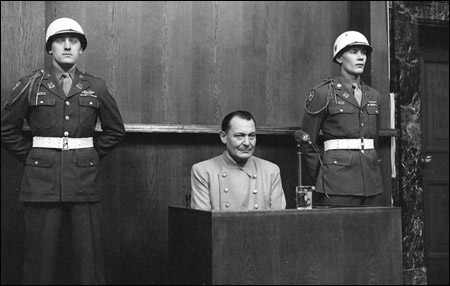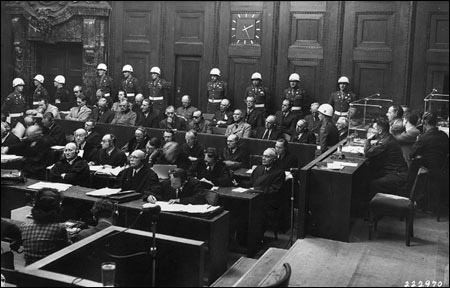HLS Web site gives access to Nuremberg Trials documents:
Library director: Permanent record helps prevent revisionists from trying to alter history

You wouldn’t expect a collection of crumbling documents from a trial that occurred more than half a century ago to still have power to shock, but Harry S. Martin, director of the Law School Library, knows better.
“It’s frightening to think how fragile the veneer of civilization is, that any country is capable of slipping into savagery if it doesn’t have the right values and social controls.”
The country Martin is referring to is Nazi Germany. The documents in question are transcripts, briefs, evidence files, and other papers relating to the Nuremberg Trials (1945-49). Harvard Law School has more than 1 million pages from the trials, filling 690 boxes. Over the years, they have been used by scholars and other interested parties, but more recently the typed, Photostatted, and mimeographed documents have become so brittle that they can no longer be handled.
To preserve the contents of these documents and to provide expanded access to the material, the library has begun a digital project to create and present images or full-text versions of its Nuremberg documents on the Internet, along with analytical information about each document and general information about the trials.
These documents are not from the trials of the Nazi political leaders and other major war criminals (these have been published and are readily available), but rather a less prominent group of defendants accused of medical experimentation on humans, torture of POWs, use of slave labor, plunder and spoliation of private property, mass murder of civilians, and the manufacture of chemical weapons. Documentation of these trials is more difficult to locate.
The prosecution of Nazi political leaders and war criminals from broad sectors of German society represented an unprecedented effort to punish people accused of war crimes. The charge of “crimes against humanity” originated in Nuremberg and set a precedent for the ad hoc tribunals to try war crimes committed in the former Yugoslavia and Rwanda.
The first stage of the project presents documents relating to Case 1 of the United States Nuremberg Military Tribunals (NMT), also known as the “Medical Case” or “Doctors’ Trial.” It was prosecuted in 1946-47 against 23 doctors and administrators accused of participating in medical experiments conducted on concentration camp inmates concerning the effects of high-altitude conditions, freezing, malaria, poison gas, sulfanilamide, bone transplantation, saltwater consumption, jaundice, sterilization, typhus, poisons, and incendiary bombs.
In addition, documents relating to the trials of two Nazi officials, NMT 2 (Erhard Milch) and NMT 4 (Oswald Pohl) have been digitized and added to the Web site.
“The documentation from such tribunals helps establish a permanent record of the truth that makes it more difficult for revisionists to try to alter history,” said Martin. “By placing this material on the Web, we hope it will be widely available to scholars of many disciplines as well as the general public.”
Although the pilot project represents only a small fraction of the entire archive, getting it on the Web in an organized and accessible form presented unprecedented challenges.
“This is probably the most complicated digital project we’ve done,” said Martin. “It was a very complicated archival problem. We spent a lot of time getting it conceptually straight.”
The team responsible for getting the pilot project up and running included: Cathy Conroy, project manager (since July 1, 2000); Silke Sahl, project manager (1998-June 30, 2000); Matthew Seccombe, document analyst; Paul Deschner, programmer and Web master (2001-); and Peter MacDonald, database programmer and Web designer (1999-2001).
Additional help was provided by the Law School Library’s Special Collections Department and the Digital Imaging and Photography Group of Harvard College Library.
The Medical Case pilot project was funded with an initial grant from the Kenneth & Evelyn Lipper Foundation. Lipper was a 1965 graduate of the Harvard Law School.





